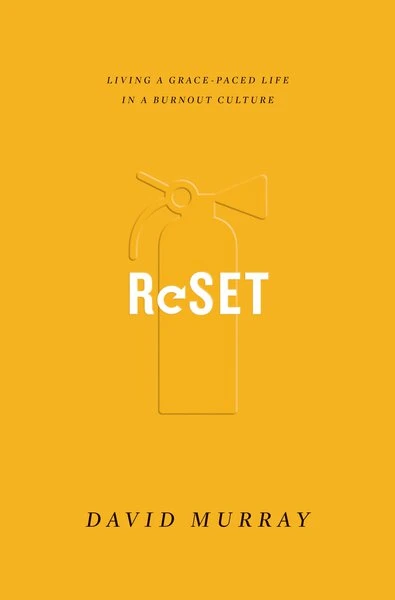
David Murray
Reviewed by: Matthew Miner
Reset: Living a Grace-Paced Life in a Burnout Culture, by David Murray. Crossway, 2017. Paperback, 206 pages, $11.46 (Amazon). Reviewed by OP elder Matthew Miner.
David Murray, professor at Puritan Reformed Theological Seminary, begins Reset with an argument for the need to pace ourselves in our Christian lives. The argument is directed to men and especially men in ministry, who, Murrays notes, often grapple with outsize family demands alongside their work in the church.
The Lord alone knows the number of our days and ordains the physical and mental health we enjoy in this fallen world. But he offers gifts that we reject to the peril of our health, gifts like Sabbath rest or physical exercise. Murray applies the gospel of our salvation to the how and what of daily living and proffers fruitful wisdom and relationship-strengthening, life-giving advice.
Murray counsels from experience. A few years ago, he received a diagnosis of “multiple blood clots in both lungs” (19) on the heels of “two other health issues, one of which…culminated in a major operation” (21),—all this shortly after a dramatic near-miss in a car accident on an icy road! Murray muses, “Did these providences give me pause? Not for long. That’s why blood clots were required. God’s message to me, through my blood, was: ‘Stop!‘“ (21–22).
In Reset, Murray “challenges [the reader] to take stock of [his] life” (24) and, quoting author J. R. Briggs, says that “self-care is the first step in caring for others, for loving your neighbor as yourself” (24). This is consonant with Paul in 1 Timothy 5 or Titus 1: You can’t serve well in the church if your family life is in shambles. And you can’t serve well in the church or your family without Christ-centered self-care.
Murray structures his book around an automobile repair and maintenance trope, drawing on the Sabbath principle to describe a routine of preventive maintenance for our bodies and souls. He contrasts obedience to God’s command to rest with disregard for the Sabbath, leading at best to costly repairs and at worst to landing ourselves in the ditch.
Murray serves up the meat of the book with a self-diagnostic quiz. He interacts comfortably with authors outside our own tradition (there’s a quote from Arianna Huffington!) and comments from disciplines outside theology, including medicine, psychology, and both the hard and social sciences. But the book remains rooted in the gospel, concluding with a chapter, “Resurrection,” on the newness that is ours in Christ.
Reading a theologian of Murray’s stature and experience, I would have welcomed even more discussion of God’s Word connected to the topic, but the book is concise, which is useful. The paperback is a terrific option for note-taking and highlighting, but the audiobook version, available on Audible and read by Murray, is excellent; in it, Murray’s love for the topic and for men in the church comes through in his voice. This was a blessing to me—and you can share the book with your wife while listening aloud in the car!
November 02, 2025
October 26, 2025
October 19, 2025
October 05, 2025
Raising Sexually Faithful Kids and
Parenting Boys and Girls in a Gender-Confused World
September 28, 2025
Calvin’s Ecclesiology: A Study in the History of Doctrine
September 21, 2025
September 14, 2025
© 2025 The Orthodox Presbyterian Church